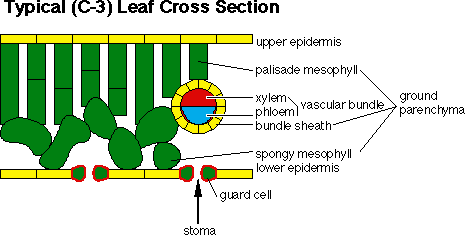
Deciduous vs Evergreen
simple/lobed
palmately/pinnately compound
Juvenile vs Mature
Determinate - fixed size and shape for species
(good for Identification)
alternate = 1/node
opposite = 2/node
whorled = >2/node

Cutin = waxy covering prevents water loss
Upper Epidermis = window-like (no chloroplasts) lets light in
Palisade Mesophyll = columns of cells doing most of photosynthesis
VeinXylem = water and minerals up from root into leafGas Spaces = O2 out and CO2 in during day, reverse at night
Phloem = sugar from leaf to rest of plant))
Spongy Mesophyll = loosely packed cells some PS
Lower Epidermis = Controls water loss prevention (cuticle) &
Guard Cells = change shape to open and close stoma
Stoma = hole for gas exchange (CO2, O2) and evaporative cooling (H2O)
Native American Charmin = Verbascum thapsis
Epidermal Hairs and chemical defense against herbivores, Cannabis
Floating Leaves have stomata in upper epidermis, air chambers beneath for floatation, Victoria at Cypress Gardens with plexiglass circle
Carnivorous Plants, get Nitrogen from digested insects, hairs help trap insect and secrete enzymes, Dionea, Drosera, Sarrascennia
This page © Ross E. Koning 1994.
The MLA citation style for this page would be:
Koning, Ross E. "Leaves". Plant Physiology Website. 1994. http://koning.ecsu.ctstateu.edu/plants_human/leaves.html (your visit date).
Go back to the Course Schedule.
Go back to Ross Koning's Home Page.
Send comments and bug reports to Ross Koning at koning@ecsu.ctstateu.edu.
View the Standard Disclaimer.